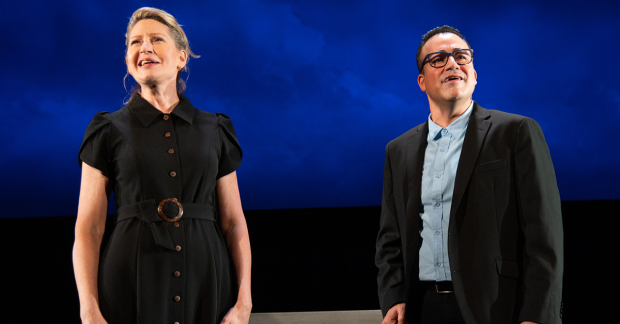Review: New/Old Michael John LaChiusa Musical Los Otros Feels of Another Time
LaChiusa pens the score for this two-hander, which has a book and lyrics by Ellen Fitzhugh.

(© Russ Rowland)
The checkered history of Michael John LaChiusa and Ellen Fitzhugh's Los Otros tells you all you need to know. Born in 2008 as an off-Broadway solo musical called Tres Ninas, the writers changed the title and widened the scope to include a second character and act for a 2012 run at the Mark Taper Forum. Revising the piece again for a 2017 engagement at the Everyman Theatre in Baltimore, they interwove the two separate stories and cut the intermission. That version of Los Otros is the one now receiving its New York debut via Premieres, which presented the original monologue nearly 15 years ago.
Directed by Noah Himmelstein at A.R.T./New York Theatres, Los Otros is at once the story of a gay Mexican American immigrant's experiences growing up in California, and the tale of a white woman's encounters with Mexican people throughout her life.
Lillian (Luba Mason) was the protagonist of the episodic Tres Ninas, which begins with her and her childhood friends providing food for a newly arrived immigrant family hiding in a cave, follows her to Tijuana as a young single mother to pick out a house worker that she illegally transports across the border, and eventually leaves her as a humiliated middle-aged drunk after taking an 18-year-old Mexican day laborer's virginity. That arc is depicted here more or less as it was.
Carlos (Caesar Samayoa) is the subject of the expanded storyline, and his side of the story follows his assimilated youth and vague encounters with racism during the years before, during, and after World War II. First working as a janitor as a tween and a plum farmer in his teens, Carlos builds a career and finds a hoarder for a partner in George, who happens to be Lillian's second ex-husband.
As usual, LaChiusa gives us a sweeping score, with styles that seamlessly vary even between musical phrases (Bruce Coughlin's orchestrations are given lovely treatment by the three-member band, led by J. Oconer Navarro). Fitzhugh's lyrics paint the vivid pictures that come to life in our mind's eye. But their final product is simultaneously too much and not enough: too much Lillian, not enough Carlos, and severely lacking in the development needed to intertwine their two stories in a dramatically satisfying way.
Honestly, I found the Lillian material to be pretty icky — the last thing we need right now is the story of a white person fetishizing people with skin darker than her own. The Carlos material works better, partially because it's better thought out, but also because Samayoa evinces comfort with the material, in contrast to Mason, who never really seems at ease. To both of their credits, they sing the hell out of the score, which goes far enough to make Himmelstein's otherwise lackadaisical production a total wash.
The fact that the creative team is severely lacking in Latinx representation only compounds my distaste for Los Otros. It's an evening that feels hopelessly dated and entirely of an era that's less forward-thinking than our own. Perhaps after all this time, the writers should give it a rest once and for all.









